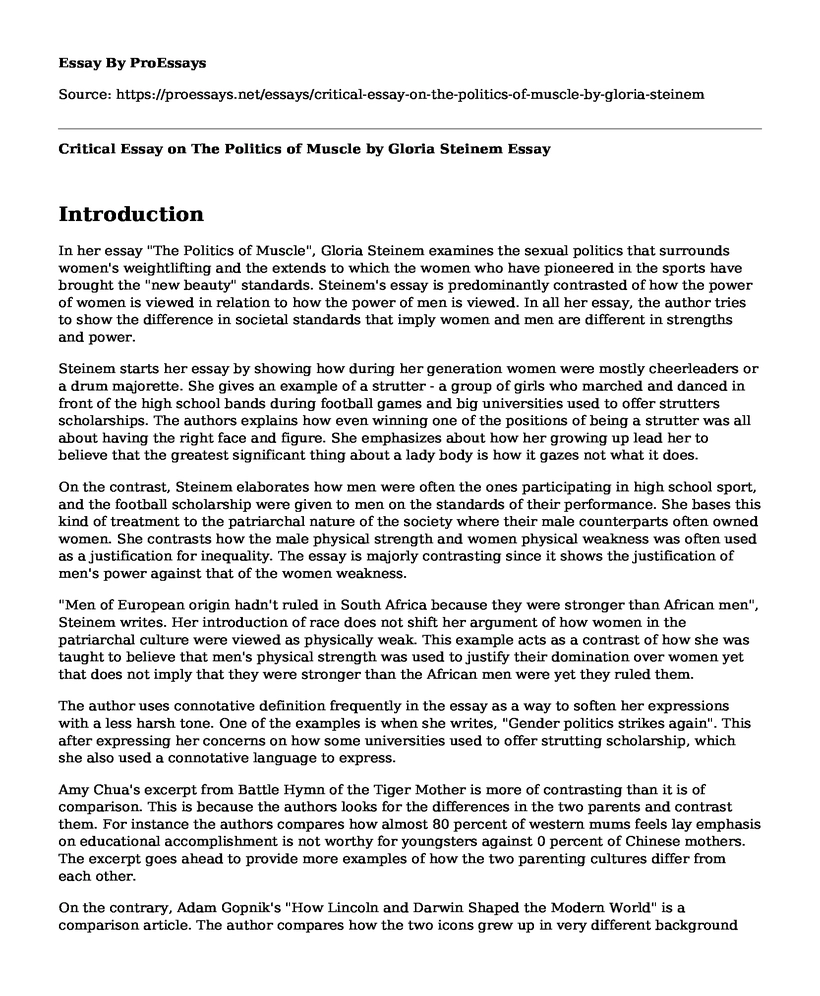Introduction
In her essay "The Politics of Muscle", Gloria Steinem examines the sexual politics that surrounds women's weightlifting and the extends to which the women who have pioneered in the sports have brought the "new beauty" standards. Steinem's essay is predominantly contrasted of how the power of women is viewed in relation to how the power of men is viewed. In all her essay, the author tries to show the difference in societal standards that imply women and men are different in strengths and power.
Steinem starts her essay by showing how during her generation women were mostly cheerleaders or a drum majorette. She gives an example of a strutter - a group of girls who marched and danced in front of the high school bands during football games and big universities used to offer strutters scholarships. The authors explains how even winning one of the positions of being a strutter was all about having the right face and figure. She emphasizes about how her growing up lead her to believe that the greatest significant thing about a lady body is how it gazes not what it does.
On the contrast, Steinem elaborates how men were often the ones participating in high school sport, and the football scholarship were given to men on the standards of their performance. She bases this kind of treatment to the patriarchal nature of the society where their male counterparts often owned women. She contrasts how the male physical strength and women physical weakness was often used as a justification for inequality. The essay is majorly contrasting since it shows the justification of men's power against that of the women weakness.
"Men of European origin hadn't ruled in South Africa because they were stronger than African men", Steinem writes. Her introduction of race does not shift her argument of how women in the patriarchal culture were viewed as physically weak. This example acts as a contrast of how she was taught to believe that men's physical strength was used to justify their domination over women yet that does not imply that they were stronger than the African men were yet they ruled them.
The author uses connotative definition frequently in the essay as a way to soften her expressions with a less harsh tone. One of the examples is when she writes, "Gender politics strikes again". This after expressing her concerns on how some universities used to offer strutting scholarship, which she also used a connotative language to express.
Amy Chua's excerpt from Battle Hymn of the Tiger Mother is more of contrasting than it is of comparison. This is because the authors looks for the differences in the two parents and contrast them. For instance the authors compares how almost 80 percent of western mums feels lay emphasis on educational accomplishment is not worthy for youngsters against 0 percent of Chinese mothers. The excerpt goes ahead to provide more examples of how the two parenting cultures differ from each other.
On the contrary, Adam Gopnik's "How Lincoln and Darwin Shaped the Modern World" is a comparison article. The author compares how the two icons grew up in very different background yet they ended up shaping the modern world to an extent of being perceived as legends. The author says that the two boys were born in the same day into different lives and ended up becoming improbable public figures.
Cite this page
Critical Essay on The Politics of Muscle by Gloria Steinem . (2022, Apr 04). Retrieved from https://proessays.net/essays/critical-essay-on-the-politics-of-muscle-by-gloria-steinem
If you are the original author of this essay and no longer wish to have it published on the ProEssays website, please click below to request its removal:
- University Tries to Mend Racial Divisions Paper Example
- Aspects of Colonialism and Racism in Selected Texts by Joseph Concard Essay
- Essay Sample on The Modern Girl and Racial Respectability in 1930s South Africa
- Research Proposal on International Humanitarian Law in Displacement Refugee Law
- Essay on the Unrewarded Labor of African Americans: A Trace of Economic History
- Gender Diversity in Business: Exploring Its Meaning and Impact - Research Paper
- Essay Example on Immigrants' Role in Strengthening US Economy & Culture







